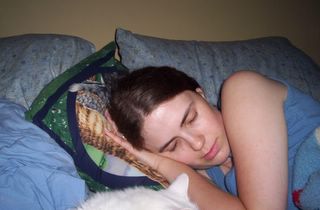I just did my oral repot on Anne Sexton for my poetry class, which included the following biography:
Anne Sexton was born in 1928 in a small town near Boston. Sexton began experimenting with poetry as a teenager, but did not seriously begin writing until late into her 20’s, after her second nervous breakdown. A housewife and mother of two daughters, Sexton seemed to have an ideal life, but was plagued with mental illness and a fascination with suicide. Poetry became her outlet, and for a time, a reason to live.
One of Sexton’s early experiences with poetry began when she saw a program on educational television about sonnets. After learning the form of the sonnet from her mother, Sexton obsessively wrote sonnet after sonnet, and although none ultimately survived to become published, the behavior set a precedent for Sexton’s vigorous approach to poetry.
Sexton regretted her own lack of formal education, but her anxiety and fear of strangers prevented her from going back to school. In retrospect, Sexton’s anxiety and panic attacks seem ironic considering the bravery that exists in her work. Sexton wrote about women’s issues that were shocking for the time, such as menstruation, sexuality and abortion. Sexton also had a tendency to write about death, which she described as “a prerequisite for life”.
The personal honesty of Sexton’s poems earned her the title of confessional poet, one shared by her mentor W.D. Snodgrass, whose poem “Heart’s Needle” reminded Sexton of her own separation from her daughters and inspired her to write “The Double Image”.
Sexton studied with John Holmes, where she met Maxine Kumin. She and Kumin formed a very close relationship, spending hours at a time critiquing each other’s work, and writing children’s books together. Upon Snodgrass’s recommendation, Sexton also studied with Robert Lowell, who helped her publish her first book
To Bedlam and Partway Back.
Sexton wrote letters and sent poems to many writers, readily accepting feedback from people she admired. She also had an epistolary relationship with James Wright, which eventually led to a dynamic and passionate affair, one that continued as she produced her second book,
All My Pretty Ones.
With two books published, Sexton had become a successful and well-recognized poet, however, it was her third book,
Live or Die that received the most recognition by winning a Pulitzer Prize in 1967. Sexton published several other books following this, including
Love Poems,
The Death Notebooks and
The Awful Rowing Toward God.
Although Sexton’s poetry flourished, she was still plagued by mental illness, as well as an addiction to alcohol and pills. She idealized suicide and looked at the methods of Monroe and Plath as archetypal ways for a woman to kill herself.
Sexton divorced from her husband “Kayo” in the early 1970’s, and further isolated herself from friends and family with needy and erratic behavior. It sounds anti-feminist, but without her husband by her side, Sexton became even more unstable. In 1974 she chose asphyxiation as her method of suicide. She left behind a completed book to be published called
45 Mercy Street.
I also read several selections of Sexton's work in my oral report, but I'm only going to include the first.
THE SUN
from
Live or DieI have heard of fish
coming up for the sun
who stayed forever,
shoulder to shoulder,
avenues of fish that never got back,
all their proud spots and solitudes
sucked out of them.
I think of flies
who come from their foul caves
out into the arena.
They are transparent at first.
Then they are blue with copper wings.
Neither bird nor acrobat
they will dry out like small black shoes.
I am an identical being.
Diseased by the cold and the smell of the house
I undress under the burning magnifying glass.
My skin flattens out like sea water.
O yellow eye,
let me be sick with your heat,
let me be feverish and frowning.
Now I am utterly given.
I am your daughter, your sweet-meat,
your priest, your mouth and your bird
and I will tell them all stories of you
until I am laid away forever,
a thin gray banner.
The poem is copyright of Linda Gray Sexton and Loring Conant, Jr.

